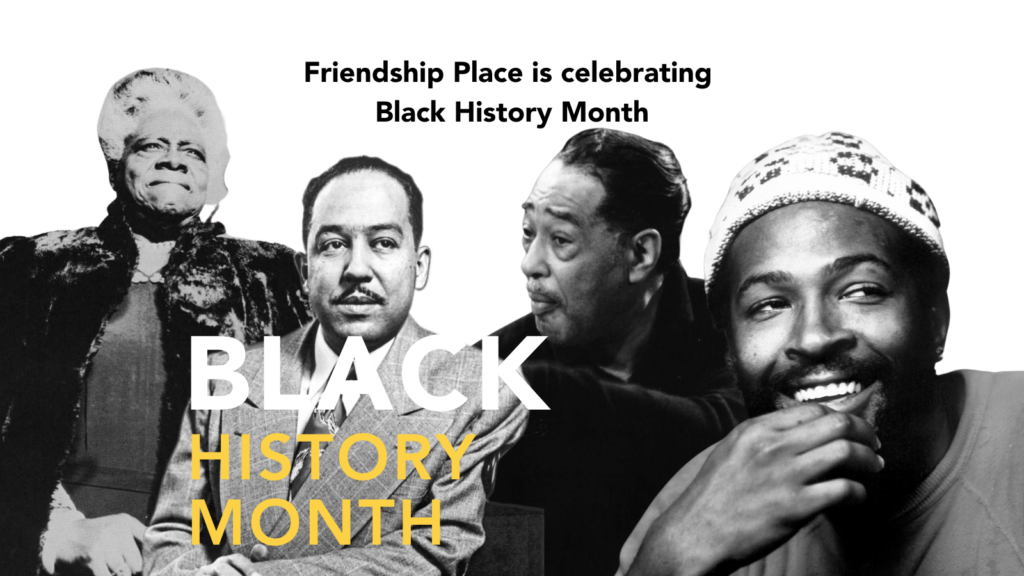Community
Washington’s Most Notable Black Figures

February is black history month
February is Black History Month – a great time to celebrate the achievements and contributions of African Americans, and recognize the immense impact people of color have had in shaping our nation.
This month, we would like to highlight African American leaders from our region who influenced society, culture, and the push for equal rights.
We hope this enables us to gain a better understanding of the immense contributions African Americans have made to our society, and learn about the courage and resilience of individuals who fought for civil rights, equal opportunity, and justice.
Read below to learn more about their incredible stories and the impact they have had on our culture.

Mary McLeod Bethune (1875-1955)
The daughter of former slaves, Mary McLeod Bethune was a leading educator and civil rights activist, known for founding what would eventually become Bethune-Cookman University in Florida, founding the National Council of Negro Women and serving as an administrator during President Franklin Delano Roosevelt’s administration. Bethune’s last home in D.C., at 1318 Vermont Ave. NW (now known as the Mary McLeod Bethune Council House) is a National Historic Site. This photo was taken in front of the United States Capital Building in the background, circa 1950. (Photo by Hulton Archive/Getty Images)
Chuck Brown (1936-2012)
Known as the “Godfather of Go-Go,” Chuck Brown shaped the sound that’s come to identify D.C. sound. Musicologists characterize this distinct musical form as a blend of Latin beats, African call-and-response, jazz, and R&B. Brown is credited for pioneering the sound and bringing it national exposure after his single “Bustin’ Loose” became a No. 1 hit in 1978. In 2015, Congresswoman Eleanor Holmes Norton, D-D.C., declared Aug. 22 as “Chuck Brown Day.” (Associated Press)


Frederick Douglass (1818-1895)
Born into slavery on Maryland’s Eastern Shore, Frederick Douglass is one of the most well-known abolitionists in American history. His autobiography, “narrative of the Life of Frederick Douglass” gives a first-person account of the cruelty of slavery and is a treatise on abolition. His D.C. home, a 21-room Victorian mansion on 1411 W. St. SE in Anacostia, is a National Historic Site. (Photo by Hulton Archive/Getty Images)
Paul Laurence Dunbar (1872-1906)
Famed African America poet Paul Laurence Dunbar, whose works influenced Harlem Renaissance writers such as Langston Hughes, lived in D.C. in the late 1800s. According to federal records, he worked as a research assistant at the Library of Congress but did not keep the job. He lived in LeDroit Park with his wife, Alice, but suffered poor health. In 1916, D.C. named a high school after the poet. Paul Laurence Dunbar Senior High School exists today at 101 N. St. NW. (Library of Congress)


Duke Ellington (1899-1974)
The renowned jazz musician was a D.C. native and was a mainstay on what was known as “Black Broadway” on U Street. According to Library of Congress records, he started playing the piano at age 7, inspired by his mom, and by the time he was 20 had formed a band and moved to New York City, earning a perch as Cotton Club’s house band and going on to become one of the most influential musicians of the 20th century. D.C.’s Duke Ellington School for the Arts bares his name today, though his legacy is still felt throughout the city. (Photo by Erich Auerback/Getty Images)
Marvin Gaye (1939-1984)
Grammy Award-winning soul singer Marvin Gaye is one of the District’s most famous musicians. He was born at Freedman’s Hospital to minister Marvin Gaye Sr., singing in church at age 4 and he was part of many singing groups as a student at Cardozo High School. Eventually, Gaye would become part of the Motown sound, earning the nickname as the Prince of Soul. Today, there are many D.C. landmarks bearing Gaye’s name, including Marvin Gaye Park in Northeast. According to D.C. records, Gaye grew up in the East Capital Dwellings on 60th Street, near the park’s east end. (Motown Publicity Photo)


Langston Hughes (1902-1967)
The Harlem Renaissance poet Langston Hughes moved to D.C. in 1924 to live with his mother, according to federal records. During this time in the District, Hughes worked as a busboy and was discovered by another poet Vachel Lindsay – a story line that was in the inspiration for D.C.’s own Busboys and Poets eatery. It’s said that the people he encountered along Seventh Street inspired his book of poetry, “Weary Blues,” in 1926. (Photo by Hulton Archive/Getty Images)
Carter G. Woodson (1857-1950)
Carter G. Woodson is considered the father of African American history. Woodson was the son of freed Virginia slaves and went on to earn a Ph.D in history from Harvard. He came up with the idea as Negro History Week to encourage Black Americans to become more interested in their own history. He founded the Association for the Study of African American History, at 1538 Ninth St. NW, which was also home. Today, the home is designated as a National Historic Site. (AP Photo)


Mary Church Terrell (1863-1954)
Suffragette and civil rights activist, Mary Church Terrell led the push to integrate D.C. eateries and also persuaded the National Association of University Women to admit Black members. She was a founder of the NAACP’s executive committee and was the first Black woman in the U.S. to earn an appointment to a school board. She lived at 326 T. St. NW in LeDroit Park. Her husband, Robert A. Terrell, was the first African American municipal judge. (Photo from Library of Congress)
Original article by WTOP.






